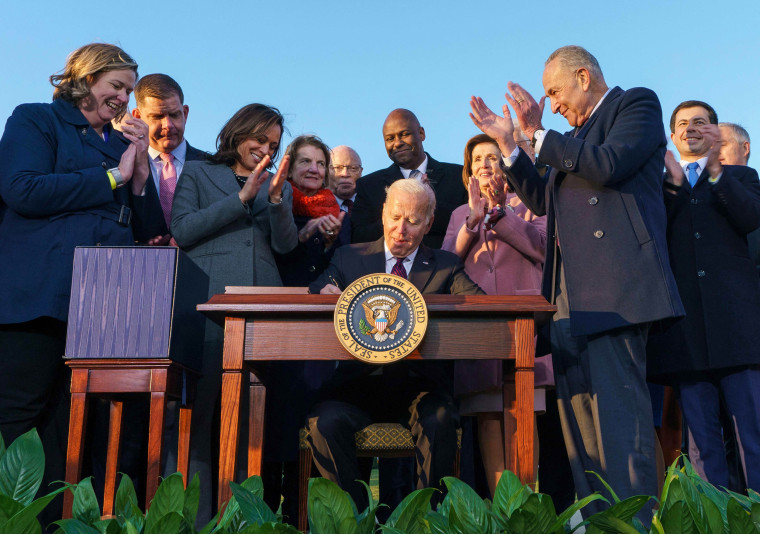At yesterday's White House signing ceremony for the Infrastructure Investment and Jobs Act, President Joe Biden didn't just focus on the domestic investments that are poised to start reaching the public. The Democrat also focused on a larger context.
"I'm going to be signing a law that is truly consequential — because we made our democracy deliver for the American people," Biden said.
If the message sounded familiar, it wasn't your imagination.
Broadly speaking, Democratic officials in the nation's capital are focused on progressive policy goals, while Republican officials are focused on standing in the majority's way. But for the president, there's often a not-so-subtle subtext to everything he does: Biden is eager, if not desperate, to demonstrate that democracy is still an effective form of government.
As we've discussed, this is especially true when addressing the nation's infrastructure needs. For example, here was the president in late June, when the parties came together on a broad framework:
"[T]his agreement signals to the world that we can function, deliver, and do significant things.... [It] signals to ourselves and to the world that American democracy can deliver."
And here was Biden in late July, when bipartisan legislation finally took shape:
"This deal signals to the world that our democracy can function, deliver, and do big things."
And here's what he said a month later, when the bill easily passed the Senate:
"I know compromise is hard for both sides, but it's important -- it's important, it's necessary -- for a democracy to be able to function.... Today, we proved that democracy can still work."
In other words, as the infrastructure talks unfolded, Biden had a motivation unrelated to the subject at hand: The president was practically preoccupied with proving to everyone, here and abroad, that the United States' system of government could still pass an important bill.
In June, The Wall Street Journal reported in passing that Biden, according to people close to him, has been influenced by the book "How Democracies Die," by Harvard professors Steven Levitsky and Daniel Ziblatt, and the evidence to support the observation is abundant.
If you haven't read the book — which, incidentally, I'd highly recommend — the basic idea is that democracies, in recent generations, haven't generally collapsed at the hands of a military coup or an armed revolution. Rather, democracies break down gradually when public institutions and political norms are weakened from within.
Biden appears to have taken the book quite seriously, even going so far as to say in his address to Congress in April that "proving that democracy is durable and strong" is "the central challenge of the age."
And so, as far as the White House is concerned, yesterday was more than a breakthrough legislative accomplishment, it was also evidence that our form of government is still capable of delivering meaningful results, undercutting global autocrats who believe that democracies are simply too messy and inefficient to function effectively.
Of course, one big bill signing does not a democracy save. It's a good start, but it's going to take more than an infrastructure package to prove to the world that self-governance is still the superior form of government.
That'll require sustained policymaking successes, the prospects of which are in the hands of a narrow Democratic majority that may disappear a year from now. Good luck to us all.

